QuestionQUESTION: Please Help! My 3.5yr. old German/Dutch has two (typical with GSD) genetic problems. First is a GI track problem with the digestion of meat protein. after a year of moderate to chronic diarrhea, this was brought under control by switching to Royal Canin German Shepherd specific formula for the (I think) hydrolyzed protein breakdowns for easier absorption, as well his treats were switched to Wellness yogurt, banana and apple (wheat free). He has been on this for 1 year. He has done exceptionally well as far as his bowel movements are concerned. However, and especially this fall and winter (2008), he has developed a "possible" (?) food allergy that has lead to severe scratching - to the point of balding and scabs on backs of ears, his lower hind legs and a bit of chewing on his forearms, as well, some back attacks where he can reach, although there is no balding on the later. I am giving benedryl to treat internally, and "vet purchased" anti-itch & antibacterial leave in conditioner externally (I want to bath him, but too big for home and too costly for groomer). He is currently on amoxicillon (4 weeks, 4 more to go)to combat any secondary bacterial infection from scratching. I give 4000 mg a day of omega 3's and (2 x 10,000 active cultures)of acidophilus bifidus. The A.B. is given two hrs. after his eve. dose of amoxicillon, to help restore his good bacteria in GI track that is killed off by antibiotics. Initially he was switched from Kirkland lamb & rice to chicken and rice and then back to lamb. Then to Nutrience supreme chicken and rice, then Nutrience holistic duck formula - very bad diarrhea at that point. Please note the new food integration were done gradually over two weeks ++ slowly changing the ratio's with no success until I switched to "Royal Canin". The common denominator in all his foods are beet pulp, rice and soy protein. Whether lamb or chicken (seems to dislike lamb a bit) he has the same muzzle rubbing (sign of allergy) on the carpet after eating. I am disheartened as the Royal Canin food did wonders for his poop crisis, and I am leery of changing. I recently added Pet Valu's performitrin "ultra" holistic lamb blend to see if chicken was the culprit (no beet pulp, but contains br. rice and whole rice). A minimal amount and it is instant diarrhea in just two days. I am switching back to strictly Royal until I can find a suitable alternative. I spoke with his trainer, and he suggested Home cooked meals starting with ground cooked chicken or beef (fat removed), steamed frozen gr. beans, carrots, peas, Brown rice, yogurt and pumpkin, with a few cc's of pure aloe vera juice shot into his mouth. The trainer has eleven dogs of his own and swears by doing the above for two of his dogs their allergies and vomiting disappeared. Note: their coats are impeccable - soft and so shiny. My vet agrees with home cooking (but would rather push "hills prescription diet"), but is totally against barf diet due to bones and GI tract problems of the GSD breed. How can I help the love of my lives uncomfortable crawling itchy skin. He is too beautiful to be all scarred up. Note: he has received Revolution flea treatments for two seasons so there is no risk of mange mites. As well his shots are up to date, he is fixed. Please advise on a home cooked diet with ratios (and alternative proteins) of protein to veg. (he loves apples and cheese with no side effects so we can incorporate),as well, applicable supplements, how much to feed per day (I will divide in half as he is fed twice daily).
Thank you in advance for taking the time to review, as well as providing a free service to help our furry friends,
Regards,
Stephanie & Gator
ANSWER: Hi Stephanie,
I'm sorry to hear about your problems with Gator! The GSD is a magnificent dog and I have to admit, I've seen a lot of this sort of problem with them. It's sad to see, but I've also helped many individuals to better health with the correct diet, so perhaps we can work on Gator with a happy result.
First; I would look at using a home prepared cooked diet, but I'd avoid both beef and chicken. Could you start with a novel protein, say rabbit, venison, or salmon? I'd work with one protein and one carbohydrate - sweet potato can work well, or sweet potato with brown rice - and concetrate first on identifying which nutrient levels - fat, fiber, protein - will best suit his sensitive bowel. You can use a digestive enzyme to help break down protein and I strongly suggest minimizing fat to start. You're aiming to do three things here;
1)maintain control over the bowel issues
2) misnimize as much of the itching as possible
3) cover all nutrient requirements.
This is a tough job for the layperson, I appreciate that. And if I were working with you professionally, I would *probably* advise a true elimination diet for a period of 3 - 10 weeks, wherein we tightly restrict his diet and observe reactions. Then and only then we start challenging with new foods to see which ones he can tolerate, and at what amount. It's a demanding approach, for you and the dog, but it provides the best results that I've ever seen. Second to this is a good home made cooked diet with appropriate nutrients and some specific supplements (L-glutamine, probiotics, enzymes, fish oils...)
To start, it's a very big job to formulate an individual diet and making a protocol for your boy is beyond the scope of what I can accomplish here. However, I would look at a home made diet starting at perhaps 28% protein, 24% fat(conservative, we usually go about 35/36%)) and the balance from carbohydrate, with a mixture of brown rice and sweet potato forming the bulk of the carb. Depending on what proteins you use, you will need to supplement; likely Vitamin D, and defintiely calcium and various minerals. (Using a small amount of liver daily will boost copper and some red meats in general provide iron, zinc etc - but I do think you should avoid beef altogether for now).
As for how much to feed, I would need to know how much he weighs and how active he is, to set you up with a number.
While I can't do the whole protocol here at AllExperts, I can give you some ideas and maybe you can get started on your own. Let me know if any of this sounds useful - can you use novel meats? And also about his weight/activity level, and we can take it a step further.
Hang in there!
Catherine
---------- FOLLOW-UP ----------
QUESTION: Hi Catherine, thank you so much for your timely response. To follow up, Gator is 95 lbs. his Dutch mother is approx. 70 lbs. and his German father is approx. 85 lbs. Gator is tall (27.5" at his withers and 26" at the rear) and long (shoulders to start of his tail 30 inches). He was the alpha of the litter, the largest and strongest. He is fit, very muscular. There is just a hint of shape with his rib cage, he is very solid thru his back to his hips, not much sloping inward toward his hips, but solid. His chest is very pronounced and graduates nicely on his underside - no big belly! We live in an apartment, so he is taken on extensive walks EVERY day. One hour in the morn, one hour in the eve. and a half hour at bedtime. He is very active a very involved in the household (never shut out or told to go lie down, he is never "in the way") If he wants to throw his ball around he can. He is not crated either (incredible when alone - does nothing wrong ever)so he is free to roam and stretch and walk around and sleep wherever he feels comfy. The vet said he is in great shape! (blood values were done two weeks ago including the white blood cell count Re: pancreas insufficiency on G.I. all came back normal)
He only eats 4 cups of the recommended 6 for Royal Canin. (has never been a big eater). He is not "over treated", usually only 3 or 4 a day and usually only after a walk.
Note: he does get off leash time, and the excessive snow has really played a part in his exercise. I look forward to hearing back from you so I can start the process of changing his diet so he can be comfortable and as happy as he deserves.
Regards,
Stephanie & Gator
AnswerHi again - well to start with I looked at the German Shepherd food and found a few anomalies, that I think might be contributing to the problem. Here is the ingredient list:
"Ingredients: Chicken meal, brown rice, rice, chicken fat, oatmeal, soy protein isolate, natural chicken flavor, powdered cellulose, dried beet pulp (sugar removed), sodium silico aluminate, anchovy oil (source of DHA), soya oil, potassium chloride, calcium carbonate, dried egg product, sodium tripolyphosphate, DL-methionine, L-tyrosine, taurine*, salt, dried brewers yeast extract (source of mannan-oligosaccharides), vitamins [DL-alpha tocopherol (source of vitamin E), L-ascorbyl-2-polyphosphate (source of vitamin C*), inositol, niacin, L-ascorbyl-2-polyphosphate (source of vitamin C2), D-calcium pantothenate, biotin, pyridoxine hydrochloride (vitamin B6), riboflavin (vitamin B2) supplement, thiamine mononitrate (vitamin B1), vitamin A acetate, folic acid, vitamin B12 supplement, vitamin D3 supplement], choline chloride, glucosamine hydrochloride*, marigold extract (Calendula officinalis L.), Trace minerals [zinc proteinate, zinc oxide, ferrous sulfate, manganese proteinate, copper proteinate, copper sulfate, manganous oxide, calcium iodate, sodium selenite], tea (green tea extract), chondroitin sulfate*, preserved with mixed tocopherols (source of vitamin E) and citric acid, rosemary extract. "
Now, what I don't like here is the oatmeal and soy, both of which can irritate the bowel in a very sensitive dog. I'd recommend using brown rice and sweet potato as your carb/fiber source in your home made diet. I would also like to see him on about 2000 calories per day, given his size and activity level. The Royal Canin has only 314 calories per cup, so 6 cups provides close to his requirement and leave room for a couple of treats. If you are feeding only four cups, thats 1200 calories plus I'm assuming whatever else he gets, such as biscuits etc.
I would therefore start a home made diet very cautiously as it always contains more water and thus provides more volume than a kibble, which has most of the water removed. We do not want to overload Gator's digestion - and with a dog like this we need some restriction of fat too, so what you end up with is a large volume of food. I'd transition him slowly,and aim for 1500 calories a day initially; if he tolerates this well, then inch the overall amount (and possibly the fat) up as well. Remember that you will need to add about 2000 mgs of calcium daily to his diet - and other nutrients such as Vitamin D and various minerals which are almost always low in a home prepared diet. It's impossible to say how much of each without an analysis of the diet, but trust me, most home made diets that have not been professionally formulated are low in many necessary nutrients.
I'm a little cautious about suggesting a generic diet for any dog with a condition, but if you plan to start home cooking yourself, I recommend Dr. Pitcairn's book Natural Health for Dogs and Cats (Amazon always has it or try www.dogwise.com). Anyone attempting home prepared diet should have a good grounding in canine nutrition and Pitcairn is a good place to start. One thing I do not like is his use of gluten grains; this is inappropriate for your dog, so avoid wheat, oatmeal etc and stick to brown/white rice and sweet potato. I also prefer not to use brewer's yeast with sensitive dogs, so again, I have some issues with the Pitcairn programme but it will help you avoid some of the common pitfalls of homefeeding.
I'm not sure if any of this helps - basically I would aim for the following:
1) about 1500 calories daily from all sources, so the total caloric intake from the home made food could be say 1350 for starters
2) fat, protein and fiber as suggested in my first email but be aware these numbers may require adjustment
3) www.nutritiondata.com is an excellent tool for figuring out the basic numbers of a diet and which foods supply the nutrients you're looking for
4) Do consider a book like Dr. Pitcairn's to help you start making balanced meals
5) Remember that overfeeding and fat are the most common causes of diarrhea in a healthy dog; with Gator, there is likely extra sensitivity to fat, possibly some types of fiber, and definitely gluten
6) I'd suggest using cooked turkey as your base protein/fat - use the light and dark meat but go easy on the skin. If he tolerates sardines, they provide extra Omega3 fatty acids, and Vitamin D...if you can use small amounts of liver, it's rich in iron, copper and Vitamin D as well, but can be too much Vitmin A if overfed. So use a little beef liver - or if it isn't tolerated, you need to make sure you supplement these minerals
7) Start calcium at 2000 mgs daily, from a purchased source like NOW, or use home made powdered eggshell. Use either citrate or carbonate and not bonemeal. Zinc and iodine are almost always low in home made diets as is manganese. I can't *really* asess what you need to supplement unless I'm looking at a recipe which precise amounts of food; then I can tell you what you need to add (or cut back on).
8) Go easy on vegetables to start, as they may provoke diarrhea. Any veggie you use should be cooked to aid digestion.
If the first batch you make isn't a success, dont lose heart. I often work for months with one dog with IBD, before we get a balanced diet that he can tolerate. If you have a lot of questions do consider joining my yahoogroup too - I have many members and clients there going through similar challenges and we have a lot of dietary information on file - including how to balance the nutrients, which is critically important for longterm health. If you get stuck at any time you can always contact me privately for more guidance, too.
Hope this helps and best of luck!
Catherine

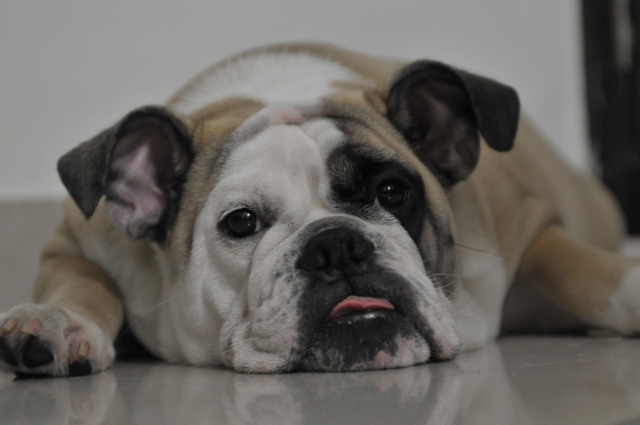 English Bulldog Food Allergies
QuestionHi,
Our English Bulldog was on Blue Buffalo Chi
English Bulldog Food Allergies
QuestionHi,
Our English Bulldog was on Blue Buffalo Chi
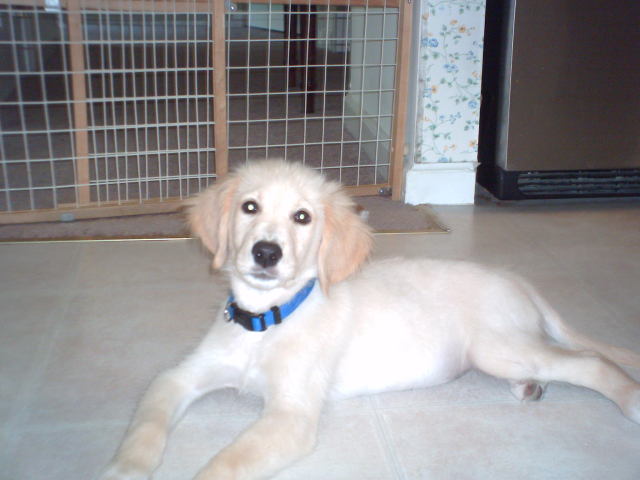 puppy crying wolf
Question
RILEY
Hi marie, Its linda<Rileys mom the li
puppy crying wolf
Question
RILEY
Hi marie, Its linda<Rileys mom the li
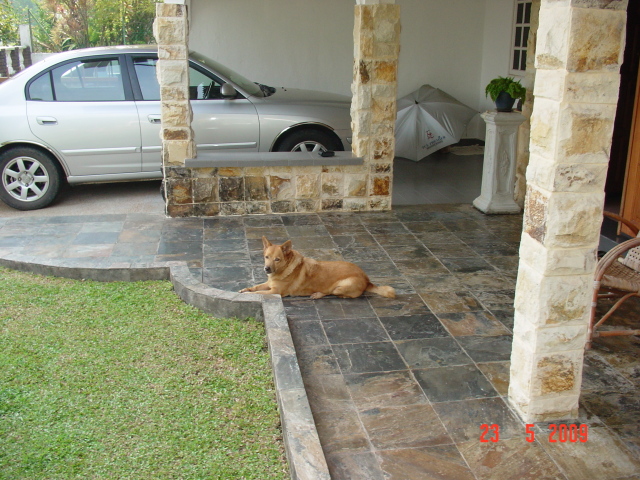 dog food problem
Question
Diana
Dogs age: 15
Last vet visit: 2 weeks ago
dog food problem
Question
Diana
Dogs age: 15
Last vet visit: 2 weeks ago
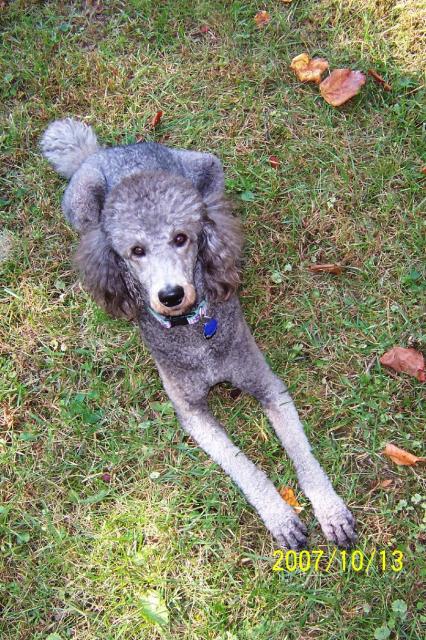 my standard poodles diet
Question
sophia
i have been cooking for my 3 year old s
my standard poodles diet
Question
sophia
i have been cooking for my 3 year old s
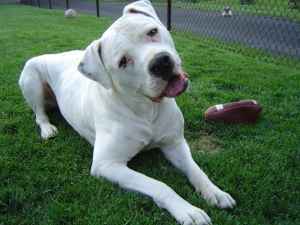 hot spots - NuVET Plus for skin and coat: Melatonin, too
QuestionI too have a pitbull who is 4 years old now who
hot spots - NuVET Plus for skin and coat: Melatonin, too
QuestionI too have a pitbull who is 4 years old now who